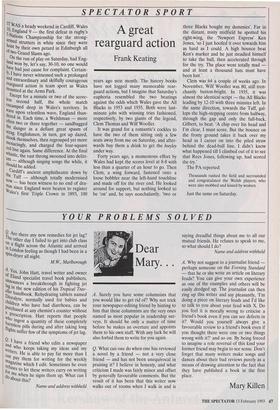YOUR PROBLEMS SOLVED
Dear Mary.. .
Q. Are there any new remedies for jet lag? The other day I failed to get into club class 911 a night across the Atlantic and arrived in London feeling as though I had been in a sPin-dryer all night.
M.W., Marlborough 4' Yes. John Hatt, travel writer and owner of Eland specialist travel book publishers, announces a breakthrough in fighting jet lag in the new edition of his Tropical Trav- erhandbook. Rehydrating tablets named rl)1! toralyte normally used for babies and Children who have had diarrhoea, can be Purchased at any chemist's counter without a prescription. Hatt reports that people hu ingest a quantity of these completely rmless pills during and after taking long nights suffer few of the symptoms of jet lag.
Q. I have a friend who edits a newspaper and who keeps taking my ideas and my writers. He is able to pay far more than I can Pay them for writing for the weekly magazine which I edit. Sometimes he even refuses to let these writers carry on writing for me when he signs them up. What can I do about this?
Name and address withheld A. Surely you have some columnists that you would like to get rid of? Why not trick your newspaper-editing friend by hinting to him that these columnists are the very ones named as most popular in readership sur- veys. It should be only a matter of time before he makes an overture and appoints them to his own staff. With any luck he will also forbid them to write for you again.
Q. What can one do when one has reviewed a novel by a friend — not a very close friend — and has not been unequivocal in praising it? I believe in honesty, and what criticism I made was fairly minor and offset by generally favourable comments. But the result of it has been that this writer now walks out of rooms when I walk in and is
saying dreadful things about me to all our mutual friends. He refuses to speak to me, so what should I do?
Name and address withheld A. Why not suggest to a journalist friend perhaps someone on the Evening Standard — that he or she write an article on literary feuds? You can give your own experience as one of the examples and others will be easily dredged up. The journalist can then ring up this writer and say pleasantly, 'I'm doing a piece on literary feuds and I'd like to talk to you about your feud with X. Do you feel it is morally wrong to criticise a friend's book even if you can see defects in it? Would you yourself always give a favourable review to a friend's book even if you thought there were one or two things wrong with it?' and so on. By being forced to imagine a role reversal of this kind your former friend may begin to see sense. Don't forget that many writers make songs and dances about their bad reviews purely as a means of drawing attention to the fact that they have published a book in the first place.
Mary Killen


















































 Previous page
Previous page